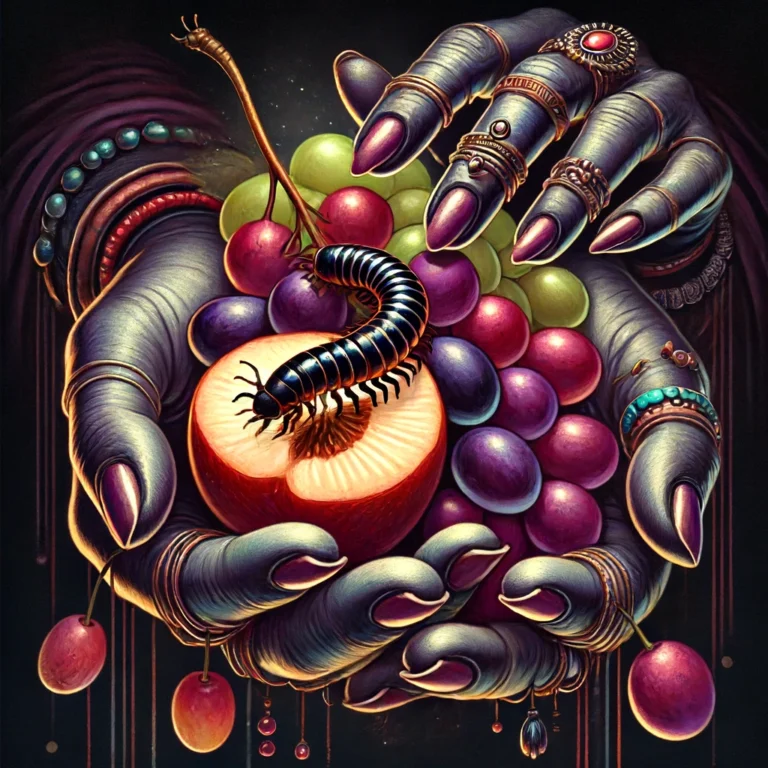
“Eat The Worm”
Imagine you’re enjoying a delicious piece of fruit, only to find a worm inside halfway through. Your first instinct might be to throw the fruit away in disgust. But what if, instead, you continued and ate the worm? This scenario teaches several important lessons.
The first sense alerting you to the worm’s presence is likely vision or taste. This situation highlights the importance of being mindful and present. Instead of reacting impulsively, consider the bigger picture and what your reaction says about your values and your relationship with the natural world. Respecting all forms of life and not letting initial reactions dictate our actions is key.
The “Eat the Worm” metaphor offers a profound lesson in mindfulness, resilience, and radical acceptance. It encourages us to look beyond the immediate, instinctual reactions to discomfort and instead embrace the complexity and imperfection of life. Here’s a breakdown of the key insights it provides:
Mindfulness and Presence: Rather than reacting impulsively to the worm in the fruit, this metaphor teaches the importance of being present and aware. Our knee-jerk reactions often miss the broader context. When we pause and reflect, we allow ourselves to see the situation holistically.
Resilience: By confronting discomfort head-on, we strengthen our ability to endure and thrive through challenges. “Eating the worm” is a metaphor for confronting fears and discomfort instead of avoiding them.
Environmental Awareness: Nature isn’t perfect, and neither are we. A worm in a piece of fruit reminds us of the intricate processes in the natural world, and how our consumption is part of a larger ecosystem. It teaches respect for the effort nature takes to sustain life.
Relationships: Just as the fruit and the worm are part of a larger whole, people come with their complexities and imperfections. Accepting someone fully, flaws and all, fosters deeper empathy and understanding.
New Experiences: The idea of “complex tastes” pushes us to give new experiences and people time to reveal their richness, instead of discarding them based on initial discomfort.
Radical Acceptance: Accepting the worm, just like accepting life’s imperfections, allows us to live more authentically. We stop striving for an illusory ideal and begin to appreciate the messy, imperfect reality of life, finding peace in what is rather than what we wish it would be.
By embracing the uncomfortable, we open ourselves up to deeper growth, a stronger connection to nature, and more authentic relationships with others and ourselves.
Radical Acceptance: “Eat the Worm” suggests accepting reality, including discomfort and imperfection. This acceptance can lead to inner peace and a more authentic way of living. It challenges societal norms that push for perfection and avoidance of flaws, proposing that true wisdom comes from integrating all aspects of life.
This idea of “eating the worm” as a transformative practice for psychics, magicians, and yogis taps into ancient wisdom and esoteric understanding in each discipline.
-
Psychic: For a psychic, “eating the worm” is akin to embracing uncomfortable truths and subtle energies. By overcoming initial aversion, they refine their perception, allowing them to tap into hidden layers of existence and communicate with spiritual realms. This practice would be a powerful way for them to navigate emotional complexities and enhance their readings. Each time the psychic chooses to “eat the worm,” they are symbolically sharpening their intuitive abilities, becoming more attuned to the energies and messages that may not be immediately obvious.
-
Magician: For the magician, the act of eating the worm represents mastery over perception and energy. Magicians work with the elements of transformation—turning something undesirable into an opportunity for growth and understanding. Eating the worm repeatedly could be seen as a ritual of self-discipline and mental alchemy, transforming discomfort into knowledge and fear into empowerment. It highlights the idea that nothing in life is without purpose and that true magic comes from embracing all aspects of existence.
-
Yogi: A yogi’s relationship with eating the worm is rooted in detachment and mindfulness. This act becomes a meditative exercise, allowing the yogi to release attachment to pleasure or pain and to observe their experience without judgment. It teaches them to see beyond the superficial and to understand that the essence of life lies in total acceptance. By eating the worm, the yogi moves closer to self-realization, transcending the ego’s resistance and aligning more deeply with universal consciousness.
Each of these spiritual paths—psychic, magician, or yogi—shares a common thread: transformation through acceptance. The metaphor of eating the worm becomes a powerful reminder that facing discomfort and integrating it into our practice leads to deeper wisdom, growth, and connection with the universe.
Remember, The worm is as good as dead when you bite into it, but you will go on living.
—Ashley June 6, 2024

